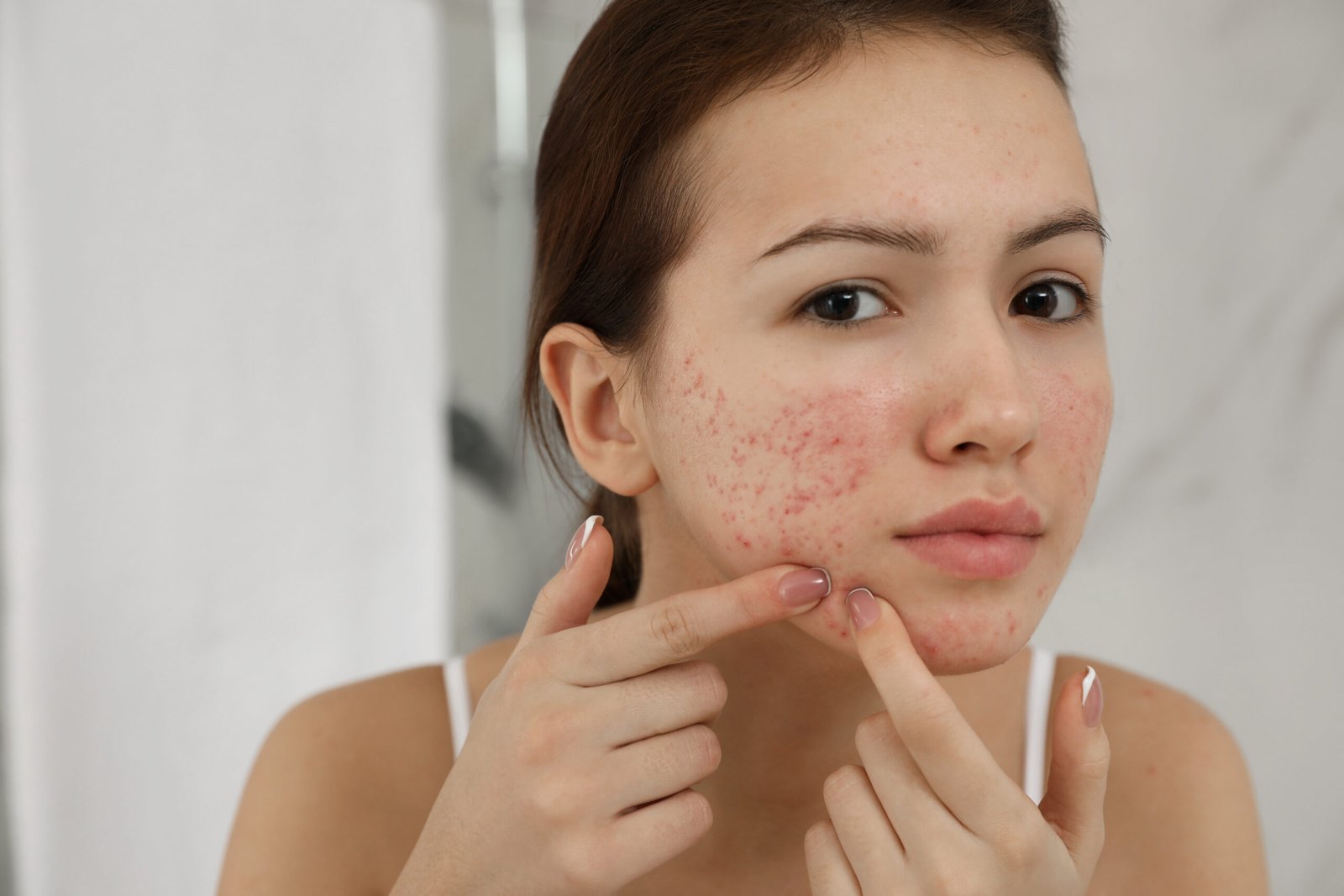Although the direct cause of acne is unknown (I don’t think they’ll find one cause), three underlying causes do contribute to the condition. When it comes to clearing acne, it’s usually a combination of factors that trigger or worsen the condition. But, these three causes are what a lot of people with acne struggle with beneath the surface of the skin. All three of these underlying causes of acne are super important to work on and balance. I know you’re desperate to work on the cause of your acne to clear your skin, so let’s get into it.
Cause 1) – Blood glucose imbalances
This is the area that has the most research around directly worsening acne. Blood glucose issues can cause acne in a few ways. To learn more about what blood glucose is, check out this blog.
Blood glucose and hormones
Imbalances in blood glucose levels can start to increase hormones IGF-1, insulin and androgens (such as testosterone). An increase in these hormones can cause the skin to become more oily and increase keratinisation which contributes to blocked pores. The addition of more oil on the skin can encourage the growth of acne-causing bacteria. You can see how this combination ends up worsening breakouts and becomes a cause of acne!
Blood Glucose and the skin
Higher levels of glucose in the blood can start to cause direct issues on the structure of the skin, too. Glucose has been shown to ‘stick’ to proteins in the skin such as collagen and elastin. This process of glucose sticking to proteins is known as glycation. Glycation causes collagen and elastin to become damaged, and this can be seen on the skin as premature ageing, fine lines and wrinkles. As well, high levels of glucose have been found to increase inflammation and slow down wound healing, which may affect the severity of acne, and how quickly it heals.
Blood glucose and bacteria
If we’re eating a high amount of sugar (which will affect our blood glucose), it starts to affect our gut health. A diet that in high in sugar and refined carbohydrates, and low in fibre, fruits and vegetables has been found to reduce beneficial bacteria. This is important to consider when we move onto cause number two!
How to balance blood glucose to clear acne
This is the most important cause of acne to work on. If you don’t balance your blood glucose, you will struggle to balance your hormones and clear your skin for good. But you’ll be glad to hear that there are a lot of easy diet changes you can make to help balance your blood glucose, and clear your skin.
Add protein and fibre to meals
Both protein and fibre help to slow the absorption of glucose into the blood stream. This reduces the risk of large glucose spikes, which is what we want! So every time you eat starchy carbohydrates (like bread, pasta or rice), see if you add protein or fibre to it.
Movement/exercise
When we exercise, our muscles use glucose for energy. So if we move after food, we can start to reduce a glucose spike that may have occurred after a meal. It doesn’t have to be intense exercise, a 5 minute brisk walk after lunch will do!
How do I know if I have blood glucose issues?
Some signs and symptoms of blood glucose issues include:
- Fatigue
- Feeling tired after food (especially high carb meals)
- Feeling shaky, irritated or hangry with periods without food
- Frequent infections (like thrush)
- Mood changes
- Excessive thirst
- Frequent urination
- Blood glucose issues are common in conditions such as PCOS
The best way to really see what’s going on with your blood sugar, is to do a blood test. Find out more about blood glucose testing here.
Cause 2) – Gut health
Another cause of acne is issues with gut health. Gut health can influence in the skin in a few ways, here’s how.
Gut health and the Absorption of nutrients
The skin needs a fair few nutrients to be able to create healthy skin cells. These nutrients come from the food that we eat, and it’s up to the gut to absorb them, so they can be transferred to the skin. However, it has been found that people with acne are more likely to suffer with hypochlorhydria. This is where people have low levels of stomach acid, which affects how well they can digest and absorb nutrients for skin health. Optimal digestion is especially important for absorbing skin-boosting minerals such as zinc and selenium.
Gut health and Benefical bacteria
The beneficial bacteria in our guts have been linked to so many areas of our health. But the gut health connection is becoming an increasingly popular topic in dermatology. Research has found that beneficial bacteria in the gut can help to regulate inflammation within the skin, support skin bacteria function and reduce severity of acne. One small study looking into men with acne found that those with more severe cases of acne, had lower levels of beneficial bacteria and short-chain fatty acids in the gut.
How to support gut health to clear acne
Healthy skin really does rely on a healthy gut. And, we need to make sure we’re eating our nutrients in the first place to help clear our skin from within.
Increase your fibre intake
The bacteria in our guts love fibre. Fibre is food for the bacteria in our gut, and it’s known as being a ‘prebiotic’. Think of prebiotics as a fertiliser you would use on plants – it helps them grow! The more fibre we eat, the more we will encourage our beneficial bacteria to flourish. You can increase fibre by increasing your fruit, vegetable and wholegrain intake.
Eat the rainbow
If increasing your vegetables is a little difficult, start with the colour of your meals. Every different coloured fruit, vegetable, herb or spice will have a different blend of polyphenols that also help our gut bugs thrive. This can be a little easier to do than increasing your vegetable intake, as herbal teas like green tea count towards your colours for the day.
MINDFUL EATING
You know what really affects how well you digest and absorb your food? How you chew it!
Do you eat while scrolling on your phone? Doing work on your laptop? Watching tv? Driving? Or maybe people say to you like ‘Wow, you ate that fast!’. Hey, I’m not judging – I’m guilty of doing this sometimes too. But when we eat with distractions (like our phones), or eat quickly, we don’t chew our food properly which then affects how well our stomach breaks down and absorbs nutrients. Next meal you have, turn your phone onto aeroplane mode and focusing on chewing your food properly. Slow everything down, think of the taste, texture and temperature of the food.
How do I know if I have gut issues?
Gut issues don’t always show up as gut symptoms. I know, sounds strange doesn’t it – how can you have gut issues without any gut symptoms? Well, because your gut is so essential for overall wellbeing, you might not notice gut symptoms, but you might notice skin issues, fatigue and inflammation – which is coming from your gut.
Other gut symptoms include:
- Nutrient deficiencies
- Bloating
- Diarrhoea
- Constipation
- Indigestion
- Acid Reflux
- A diagnosis of IBS or IBD
- Abdominal pain
- Nausea
Cause 3) – Hormonal Imbalances
Hormonal imbalances are usually thought to be the cause of acne. And while it’s true that the typical adult acne picture of cystic acne on the jawline, neck, chest or back is most likely related to hormones, why are you hormones off balance in the first place? Hormones do not just become off balance because they feel like it. There’s always something else driving the hormonal imbalances. And that’s why I put blood glucose and gut health before hormones.
It’s really hard to balance your hormones if you’re on a blood sugar rollercoaster of spikes and crashes all day. Why? Because aside from the fact that both high glucose and high insulin cause imbalances in testosterone (which then affects your skin). High glucose spikes and crashes increase cortisol! Cortisol is your stress hormone, and another thing that throws our sex hormones off balance. So, before you go searching for ‘the best supplement to clear hormonal acne’, or ‘best skincare for hormonal acne’. Just pause for a second and think – why are my hormones off balance?
Now, the hormone that is commonly linked to acne is testosterone. This can be raised in both male and females, and tends to cause more cystic forms of acne. It does this by increasing oil production in the skin, which then attracts acne-causing bacteria into the pore, which then causing inflammation in the skin.
How to support your hormones to clear your acne
You know what I’m going to say first… Balance your blood glucose and work on your gut health! Both of these factors will hugely impact your hormonal health, so make sure you’ve got those ticked off first. From there, I’d recommend to do some blood tests to truly see which hormones are off balance and what could be causing it. You can find out more about hormone tests here. But there are some foods that can help your hormones.
Increase zinc rich foods
Zinc is essential for the creation of sex hormones. It’s also been found to help regulate testosterone levels and support overall skin health. Remember though, a zinc deficiency can be caused by issues with gut health and stomach acid, so consider that factor too! You’ll get zinc from oysters (although, I don’t think this is a regular food intake for most people), red meat, shellfish and pumpkin seeds.
Try spearmint tea
Two cups of spearmint tea daily for one month has been found to help regulate high levels of testosterone, that can contribute to more severe cases of acne. But, this will only work if high levels of testosterone is the cause of your acne.
How do I know if I have hormonal imbalances?
There are a few signs and symptoms that will vary in men and women. It also depends on which hormone is off balance, and each hormone produces different symptoms. See why I think it’s best to test instead of taking random stabs in the dark?
Signs and symptoms of hormonal imbalances in women:
- Acne and oily skin
- Anxiety and depression
- Low libido
- Painful periods
- Hair loss on the head
- Increased hair growth on the face or body
- Vaginal dryness
- Hot flashes
- Heavy periods
- Missing periods
Signs and symptoms of hormonal imbalances in men:
- Acne
- Changes in libido
- Erectile dysfunction
- Decrease in muscle mass
- Increase in body fat
- Development of breasts
- Depression
- Low sperm count
- Loss of hair on shins
Need some extra help?
If you feel like you’re doing a lot of the diet recommendations already in this blog, and haven’t seen any results with your skin yet, I’d recommend functional testing. This will help to highlight any other underlying causes that could be driving your skin condition and preventing you from achieving the clear skin you deserve. If you’re ready to get started, you can learn more about nutritional therapy consultations here.





0 Comments